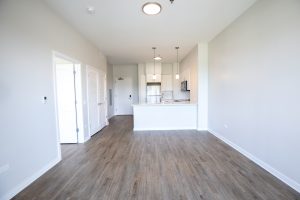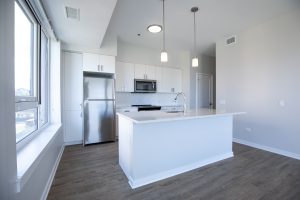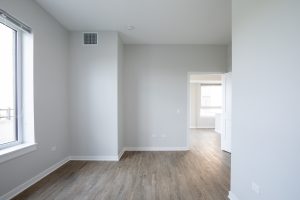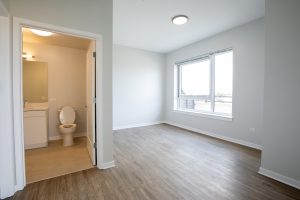23rd Place at Southbridge
- Location: Chicago
- Completed: January 2023
- Delivery method: General contractor
Powers & Sons Construction and a JV partner were selected to build two six-story multi-family buildings on an 11-acre site for 23rd Place at Southbridge. The development is the first phase of Southbridge, a new mixed-use community at 2300 South State Street in Chicago. It was one of four finalists in the residential/hospitality category for the Chicago Building Congress (CBC) 2023 Merit Awards.
The scope of work included 60,000 SF of ground-level retail space with 103 apartments, some with balconies, on the upper levels. The studio, one-, and two-bedroom units offer residents expansive city views, spacious floor plans, and a washer and dryer. Amenities and common areas for each building include outdoor grills and a fire pit, roof-top lounge, conference room, dog spa, indoor bike storage, a pro-grade fitness center, package and mail receiving areas, community event spaces, controlled entry access, and surface level parking.
The pedestrian-friendly buildings are within walking distance of Chicago Transit Authority (CTA) Green Line and Red Line stations and multiple bus routes. They connect historic Bronzeville with vibrant and emerging South Loop neighborhoods, including Chinatown and the Motor Row District, providing modern homes in a mixed-income and mixed-use setting. The area has experienced strong population and household growth with a high level of income disparity among residents.
The development is located on the footprint of the former Harold Ickes Homes, a Chicago Housing Authority (CHA) development. Southbridge is a CHA Plan Forward site in which nearly half of the apartments are designated as affordable for households earning up to 60% of the area median income. The program was created to leverage the power of affordable, modern, and safe housing to help communities thrive and low-income families increase their potential for long-term economic success and a sustained high quality of life.
In addition to CHA, partners included the Illinois Housing Development Authority and the City of Chicago Department of Planning & Development. Funding sources included low-income housing tax credits.

























